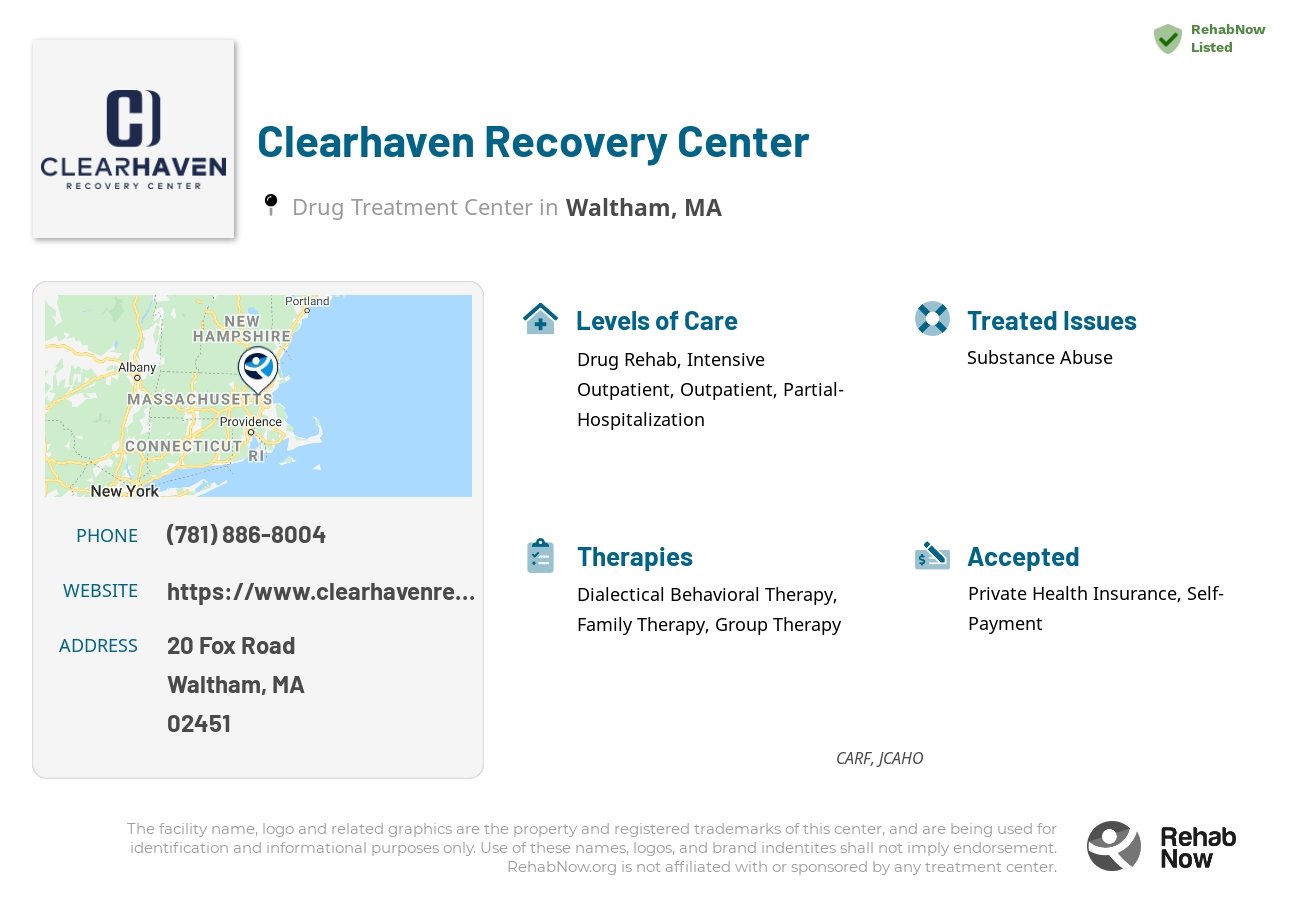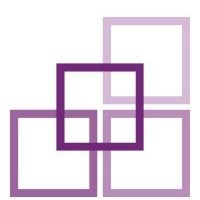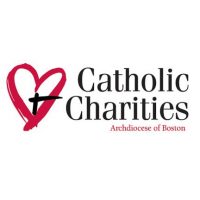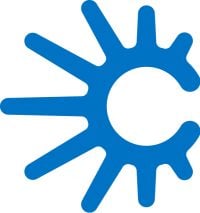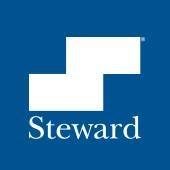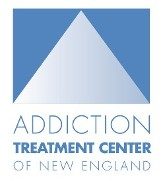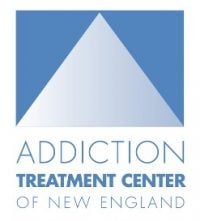Clearhaven Recovery Center
Drug Rehab Center in Waltham, Massachusetts
Clearhaven Recovery Center is an accredited addiction treatment facility in Waltham, MA that offers individualized evidence-based drug rehab programs for substance abuse, drug addiction, mental health, and alcoholism, with various levels of care, and accepts most private health insurance plans.
About Clearhaven Recovery Center in Massachusetts
Clearhaven Recovery Center, nestled in Waltham, MA, focuses on helping individuals overcome addiction through a specialized program that incorporates a 12-step approach and clinical immersion. With a capacity of 10 beds, this facility offers a unique blend of compassionate care, underscored by the personal recovery experiences of many team members.
Recognized for its excellence with accreditations from CARF, JCAHO, and LegitScript, Clearhaven proves its commitment to quality care and high standards. The seasoned team at Clearhaven utilizes their own recovery journeys to provide empathetic and supportive treatment, creating personalized plans for healing.
- Offers a comprehensive treatment utilizing the 12-step program approach.
- Team members with firsthand recovery experience provide unmatched support and empathy.
- Accredited by CARF, JCAHO, and LegitScript, ensuring high-quality care standards.
At Clearhaven Recovery Center, individuals struggling with substance abuse, drugs, alcohol, mental health issues, and dual diagnoses find a path to recovery. Treatment methods include outpatient programs, partial-hospitalization, and detox, crafted to address both symptoms and underlying causes.
Genders
Ages
Modality
Additional
Accreditations

LegitScript

JCAHO

CARF
The Commission on Accreditation of Rehabilitation Facilities (CARF) is a non-profit organization that specifically accredits rehab organizations. Founded in 1966, CARF's, mission is to help service providers like rehab facilities maintain high standards of care.
Conditions and Issues Treated
Substance abuse creates problems that affect people in Waltham, MA on many levels. First, substance abuse affects the individual who is abusing drugs or alcohol. This can result in health problems, including heart damage and overdose. Substance abuse also affects the user’s family, friends, co-workers, classmates, or peers. These people feel frustrated because they do not know how to help their loved ones struggling with addiction. At the same time, the addict cannot control his behavior. Lastly, friends and family members of addicts are affected financially by substance abuse.
The good news is that effective treatments can help prevent substance abuse or treat its effects on the user. These treatments, which include behavioral therapy and counseling sessions, target the underlying causes of substance abuse, helping users achieve sobriety so they can regain control over their lives. They also teach users to cope with stress in ways other than using drugs or alcohol.
Levels of Care Offered
This center offers a variety of custom treatment tailored to individual recovery. Currently available are Detox, Drug Rehab, Inpatient, Intensive Outpatient, Outpatient, Partial-Hospitalization, with additional therapies available as listed below.
The first level of recovery is detox. It involves giving a person the opportunity to get the toxins out of their body safely. The individual receiving treatment at Clearhaven Recovery Center typically will get ill during detox, and they will often start using again to get rid of unpleasant emotions and complicated physical responses. It is why having a Massachusetts medical professional present is so critical. A medical professional can make sure that patients do not start using again during detox and stay physically healthy during the process. They will also have treatment on a mental level to relieve their symptoms and guide them through the process.
Going to an inpatient rehab facility means living there while all aspects of addiction or co-occurring disorder get addressed. The treatment involves medical supervision, therapy, and future planning.
This type of rehabilitation provides a drug-free environment for people who struggle with chronic/long-term addiction without having access to drugs outside the center (or their own home). It takes away any distractions because they live there 24 hours per day. If someone is trying to break out old habits, which could lead them back into substance abuse, things like jobs or school can be put on hold until after they complete their stay to focus solely on recovery.
Outpatient addiction treatment is beneficial for people who are able to function well in their day-to-day lives. It is recommended for people who are not yet ready to end their relationships with friends or family members who might be encouraging drug and alcohol use.
Intensive outpatient treatment is beneficial for:
- People who are able to attend treatment more than 3 times per week.
- People who do not meet the criteria for inpatient treatment.
- People who are able to contribute to their own recovery outside of the treatment center.
- People who are motivated towards recovery.
- People who are able to overcome addiction on their own without the need for higher levels of care.
Outpatient programs at Clearhaven Recovery Center, the Waltham resident can live with their family while continuing with their job or studies. Treatment includes educating the patient on drug abuse, medications, and counseling sessions at the individual or group level. Outpatient treatment plans cover diagnosis, detoxification, management, and counseling. They are a popular option for those who have graduated from inpatient facilities.
Partial Hospitalization Program is often the second level of treatment for those who have graduated from inpatient facilities. It is a good choice for someone who does not need to go through a medically supervised detox and has a supportive home environment. It requires motivation and dedication to commit to the program without constant monitoring. This can be an ideal choice for someone on a limited budget, a lower level of addiction, home and work commitments that cannot be modified, and high motivation.
Therapies & Programs
Individual therapy is a form of counseling where you meet with a trained professional one-on-one. Meeting with a therapist in this setting allows for a personal and trusting relationship to be built. This allows the patient to open up about sensitive or private issues they may not feel comfortable discussing in a group. Individual therapy helps identify the root causes of your addiction, which can help prevent relapse.
Family therapy is often done alongside drug treatment to help addicts stay sober. The goal of family therapy for drug addiction is to create an environment where communication can happen without judgment, hostility, or blame. The therapist will sit with the family so they can learn how to communicate differently and provide new tools for dealing with emotions so that people don’t want to drink or do drugs. It’s important for families to focus on relapse prevention plans during treatment so that if the addict feels like they want to use again, they’ll know what steps they need to take together to prevent it from happening again in the future.
Group therapy sessions are another common addiction recovery service. These group sessions typically involve six to 12 addicts who meet regularly with a trained professional for support and guidance.
During these sessions, the group shares their experiences with one another and provides feedback that can help each member avoid relapse or overcome specific obstacles they are facing in their recovery process. With this type of support and guidance, addicts can feel like they are part of a community that understands their struggles and will help them get through the hard times.
Dialectical Behavior Therapy was developed in the 1980s to treat chronically suicidal individuals. It is a cognitive-behavioral therapy that combines standard DBT with strategies derived from Zen Buddhism, such as mindfulness training.
DBT has been adapted for use with other types of psychiatric problems, including eating disorders, substance abuse disorders, borderline personality disorder, posttraumatic stress disorder (PTSD), and other personality disorders. Dialectical Behavior Therapy is considered a psychosocial treatment of BPD. This means that while it can be used alone or in conjunction with drug treatments, DBT does not rely on medications to treat the disorder. Instead, DBT aims to help patients change their thinking and behavior.
Cognitive Behavioral Therapy (CBT) focuses on the underlying thoughts and behaviors that caused the problem of addiction in the first place and may cause a relapse. Negative feelings are common in drug abuse disorders, but they can lead to co-occurring disorders if not recognized. CBT involves strategies that help to change the behavior pattern by restructuring negative thoughts into positive ones. It helps to remove these feelings, and it provides long-term benefits. Also, CBT promotes self-awareness and self-control. It can be administered as a monotherapy or as part of combination therapy.
CBT can improve the patient’s mood, reduce drug cravings and boost success rates on treatment plans. Regular practice can help individuals handle negative attitudes, thoughts, and feelings without turning to drugs or alcohol. The core belief of Cognitive Behavioral Therapy (CBT) is that one’s moods, behaviors, and actions are all connected. Individuals can improve their quality of life using CBT. It helps addicts understand the patterns of thought and feelings that cause them to use drugs or alcohol and develop a healthy response.
Eye Movement Desensitization and Reprocessing (EMDR) therapy is a treatment method that helps reduce the impact of traumatic memories on individuals. It involves following a bar of light or watching a therapist’s finger move back and forth. This mimics the eye movements of REM sleep, which allows the brain to reprocess memories. EMDR therapy is combined with behavioral therapies to address the root cause of the problem. This reduces the desire to escape painful memories with drugs.
EMDR can be helpful for people who turn to drugs to escape traumatic events. It is a treatment that reduces the impact these memories have on emotions. Individuals who suffer from negative feelings associated with a traumatic experience can find relief in EMDR therapy. This treatment is combined with behavioral therapies. Patients follow a bar of light throughout the session or watch their therapist’s finger move back and forth. These rapid eye movements reduce feelings of negativity and promote calmness and relaxation. This minimizes the impact traumatic memories have on emotions, reducing the desire to escape painful memories with drugs.
It’s not as simple as quitting drinking or using drugs and expecting the hard part to be over. Many addicts in recovery have discovered that they need to improve skills such as time management, organization, communication, socialization, and self-esteem. Learning certain life skills can help those who are struggling with addiction.
The 12-step program is one of the most common forms of addiction treatment today. It consists of attending meetings and working with a sponsor to follow the 12 steps outlined by Alcoholics Anonymous (AA). The 12-step program was created to assist alcoholics in getting sober and staying clean. However, it is now used for a variety of addictive substances. The 12-step program encourages addicts to completely give up their former lifestyle, which is not always practical or possible for everyone.
It is essential to remember that abstinence from drugs and alcohol is the only way to ensure long-term sobriety.
12-Step programs can be beneficial for some people, but it all depends on the individual and whether or not they’re capable of completely giving up their addiction. This method is not for addicts who are unwilling to or have no desire to quit using and so is best utilized when paired with other treatment methods.
Patient Experience
Experiential Therapy at Clearhaven Recovery Center
Drug addiction causes the formation of abnormal connections between neurons in the brain to form due to repeated exposure to drugs. These connections are responsible for addictive behaviors to drugs. Experiential therapy is done with patients individually and is different from traditional talk therapy. This therapy can help people revisit past traumas, heal, and move on in life in a more authentic way.
Experiential therapy uses activities to recreate experiences that may have caused trauma or negative emotions. These activities include role-playing, arts and crafts, animal care, music, or rock climbing. The individual will gradually experience calmness and love and change their perception positively through this therapy. Other than drug addiction, experiential therapy can be helpful for behavioral or eating disorders.
Payment Options Accepted
For specific insurance or payment methods please contact us.
Is your insurance accepted?
Ask an expert, call (888) 674-0062
Additional Details
Specifics, location, and helpful extra information.
Waltham, Massachusetts 2451 Phone Number(781) 886-8004 Meta DetailsUpdated April 15, 2024
Staff Verified
Is Clearhaven Recovery Center a LegitScript Verified Treatment Facility?
According to our most recent records, we have found this center to be LegitScript verified.
Clearhaven Recovery Center Patient Reviews
There are no reviews yet. Be the first one to write one.
Waltham, Massachusetts Addiction Information
Massachusetts has one of the highest rates of drug abuse in the country. More than half a million Massachusetts residents abuse alcohol while more than 1.5 million use illegal drugs each year. This drug and alcohol usage is the cause of over 8% of all deaths in the state. In 2017, Massachusetts ranked in the top 10 of the states with the highest opioid overdose rates.
Waltham, Massachusetts, has a population of 60,000 people. There were 26 deaths due to drug overdose in Waltham in 2017. This is a rate of 43.3 deaths per 100,000 people. Over 1,800 emergency room visits in Waltham related to drug abuse in 2014. This cost the community over 6 million dollars. Most drug rehab programs in Waltham, Massachusetts, offer various services such as individual and group therapy, medication management, and educational classes.
Treatment in Nearby Cities
- Wakefield, MA (13.0 mi.)
- Princeton, MA (31.5 mi.)
- Indian Orchard, MA (65.2 mi.)
- Spencer, MA (38.3 mi.)
- Attleboro, MA (30.3 mi.)
Centers near Clearhaven Recovery Center
The facility name, logo and brand are the property and registered trademarks of Clearhaven Recovery Center, and are being used for identification and informational purposes only. Use of these names, logos and brands shall not imply endorsement. RehabNow.org is not affiliated with or sponsored by Clearhaven Recovery Center.





